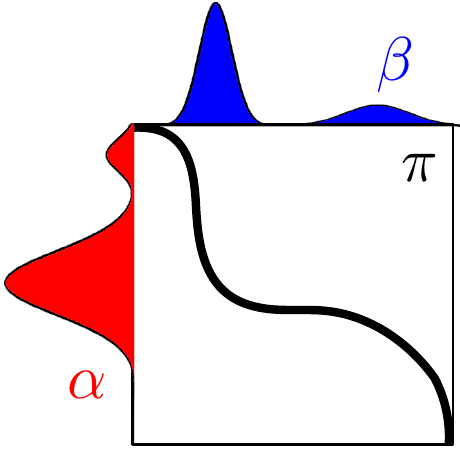
Welcome to the homepage of the
Mathematical Optimization for Data Science Group
Department of Mathematics and Computer Science, Saarland University, Germany
|
Seminar on Computational Optimal Transport |
|
Lecturer: Peter Ochs Winter Term 2024/2025 Seminar for Mathematics and Computer Science 7 ECTS Time: Tuesday 2 - 4 pm. First meeting: 29.10.2024, E1.1, room 4.12. Teaching Assistants: Shida Wang Language: English Prerequisites: Basics of Mathematics (e.g. Linear Algebra 1-2, Analysis 1-3, Mathematics 1-3 for Computer Science) |
 [Peyre and Cuturi 2020] |
| |||||
| News | |||||
|
10.09.2024: Webpage is online. | |||||
| Description | |||||
| Optimal transport, originally introduced by Monge and further developed by Kantorovich, has broad applications in fields like economics, fluid mechanics, machine learning, computer vision, and data science. In this seminar, we will study a lecture note called "Computational Optimal Transport" by Gabriel Peyré with several related papers, covering topics from the classic "Wasserstein GAN" to more recent works on the applications of optimal transport in machine learning. By the end of the seminar, students will have a solid understanding of optimal transport theory and an overview of its recent use in machine learning. | |||||
| Registration: | |||||
|
Register via the Seminar Assignment System at SIC Seminars. For students from mathematics who cannnot register via this system, please write an eMail to Peter Ochs. | |||||
| Requirements for Successful Participation: | |||||
|
Format: (in-person participation only) Each student is assigned to three papers (assigned by us): one student gives the presentation on the paper, and the two other students take the role of moderators, i.e., they lead the discussion after the presentation. Rules:
| |||||
| Documentation and Schedule: | |||||
|
The main reference for the seminar is: Gabriel Peyré, Marco Cuturi: Computational Optimal Transport 2020. |
MOP Group
©2017-2025
The author is not
responsible for
the content of
external pages.
 Saarland
Saarland